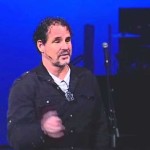We run our website the way we wished the whole internet worked: we provide high quality original content with no ads. We are funded solely by your direct support. Please consider supporting this project.

Do Not Fear
We interrupt this election season to bring you the following reminder:
[F]ear is a diabolic force. Its ultimate creator is Satan, and he uses it to keep us in bondage (Heb. 2:15). Throughout history, leaders have used fear to rally the masses around their causes, sometimes getting them to do things they otherwise would never dream of. Most of the worst atrocities committed in history–by so called Christians and others–were motivated by fear. People felt threatened, demonized the ones who threatened them, and thus felt justified in doing whatever they thought necessary to protect themselves. It is impossible to live in love and live in fear at the same time, which is why Scripture says that love casts out fear (1 John 4:18).
Now, as kingdom people we are called to live in love, which means we are called and empowered to live free of fear. Because our source of worth, significance, and security is found exclusively in God’s love and God’s reign, not our own immediate well-being, and because we believe in the resurrection, we are empowered to love even those who threaten our well-being–for this does not threaten our essential worth, significance, and security. We are, therefore, not to fear them (see 1 Peter 3:14-18). If we do fear them, it is only because some element of our essential worth, significance, and security is rooted in what they threaten. In other words, fear is an indication that we are living in idolatry, not love.
All this is to say that kingdom people whose lives are exclusively rooted in Jesus Christ will not succumb to motivation by fear. Our motivation for all we do is to be love, not fear (1 For. 16:14; 2 For. 5:14).
–The Myth of a Christian Nation, pp. 179-180
Photo credit: Greg Rakozy via Unsplash
Category: General
Tags: Fear, Love, Politics, Religious Idolatry
Related Reading

The Good Samaritan, Non-Violence & Eternal Life
Renaud Camus via Compfight An expert in the law asked Jesus what he had to do “to inherit eternal life” (See the story in Luke 10:25 and following). Jesus asked him what he thought the law said about this issue. The man responded, “’Love the Lord your God with all your heart and with all…

Sermon Clip: The Worst of Sinners
In this short clip, Greg Boyd discusses Paul’s definition of love. In the full sermon, Greg talks about how in this dog eat dog world, we’re programmed to judge others. But to love others with unsurpassable worth, we must ascribe worth to them at cost to ourselves. In this sermon, Greg talks about how to…

Shouldn’t preachers rally Christians to fight political injustice?
Question: My pastor has publicly supported your book The Myth of a Christian Nation. But he’s recently called on the church to take a stand against the injustice of our local government cutting funding for inner city recreational facilities. This seems right to me, since we’re suppose to defend the cause of the poor and oppressed.…

What the hell are we doing here?
Meet Collin Simula. He lives in Columbus, Ohio, and is a part of Central Vineyard church. He is a 30-year-old graphic designer, and a happily married father of three. Collin has spent his whole life in the Church, in every denomination imaginable, from Calvinist/Christian Reformed churches, to a Baptist high school, being a part of…

The Revelation of God in the Cross
The cross cannot be understood apart from the resurrection, just as the resurrection can never be understood apart from the cross. They are two sides of the same coin. If you consider the cross apart from the resurrection, then the crucified Christ becomes nothing more than one of the many thousands of people who were…

Is the Separation of Church and State Satan’s Idea?
I encourage you to read this article. In it, Rick Perry claims that the idea of the separation of the church and state is from Satan, and he and others will next week embark on a 40 days to save America campaign, which (as far as I can tell) means “40 days to save America…
